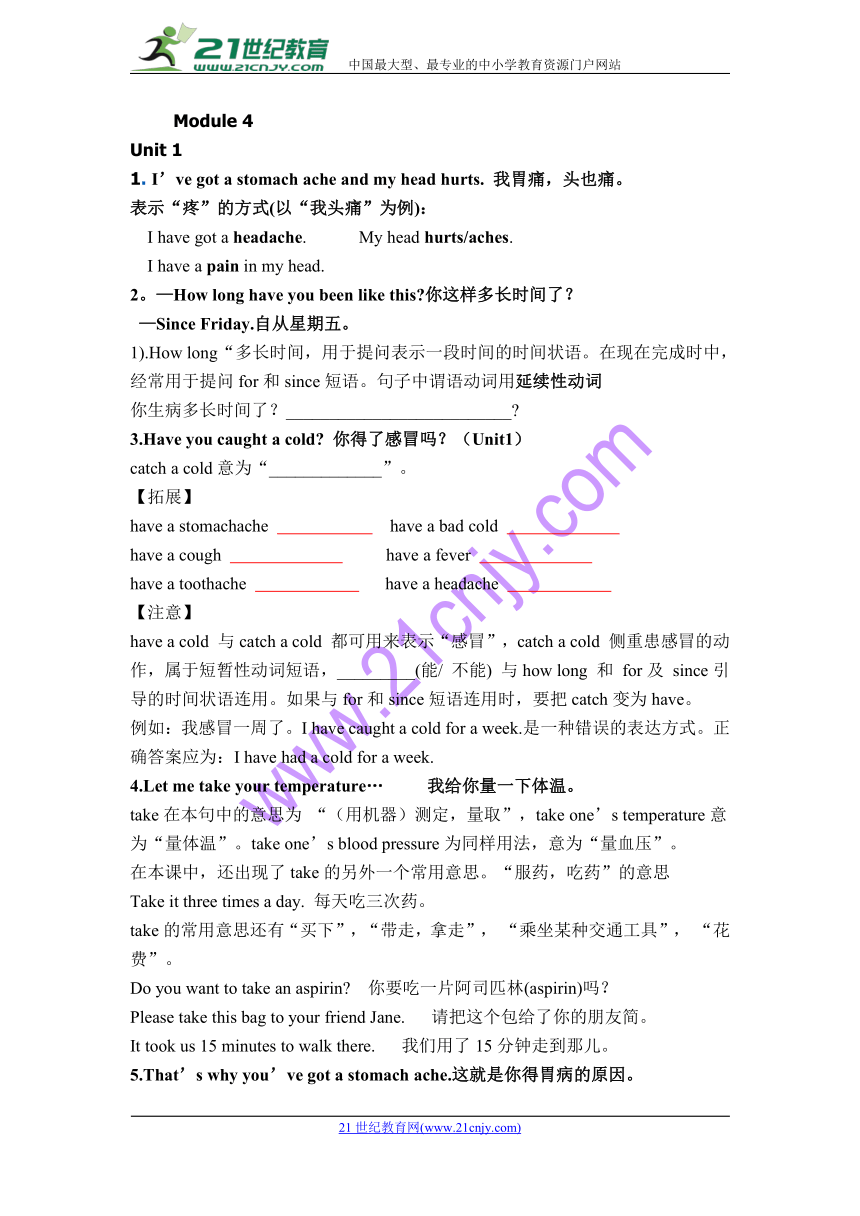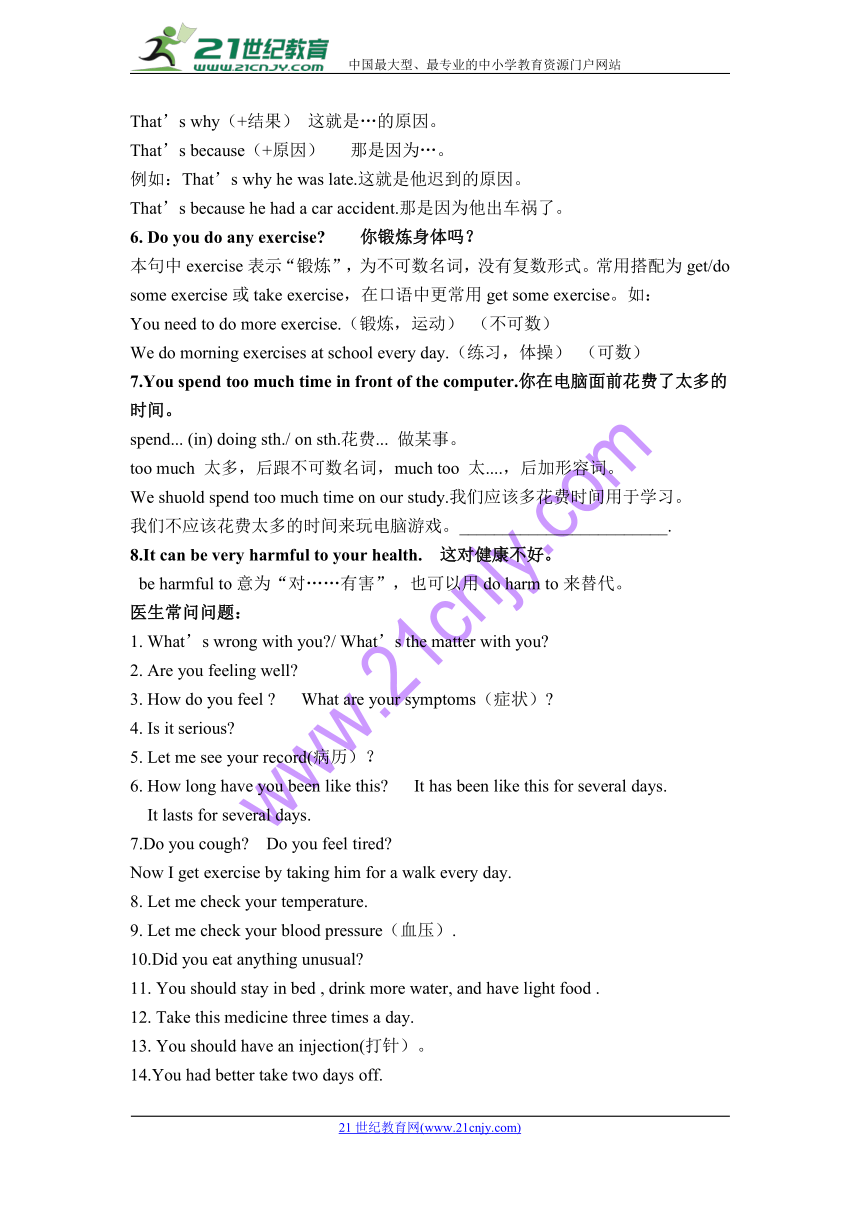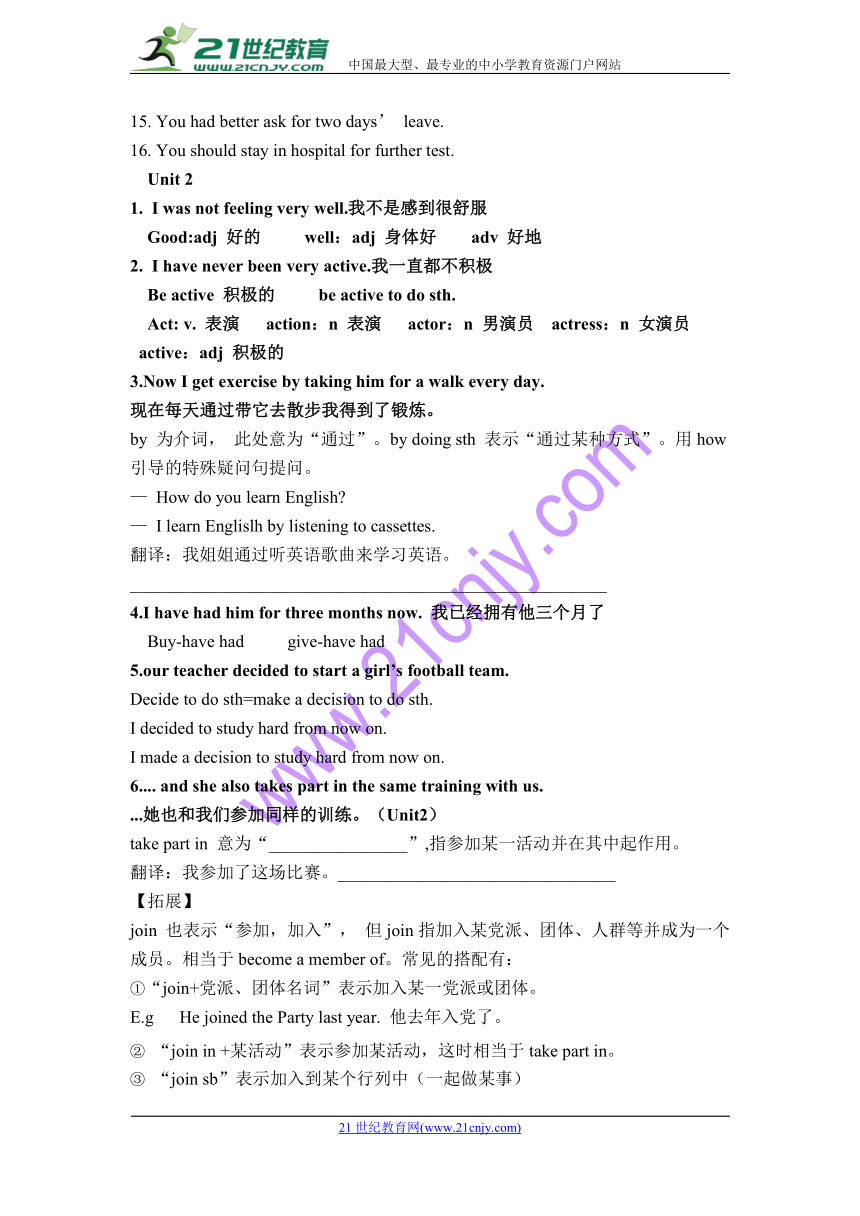Module4 Seeing the doctor学案
文档属性
| 名称 | Module4 Seeing the doctor学案 |  | |
| 格式 | zip | ||
| 文件大小 | 124.2KB | ||
| 资源类型 | 教案 | ||
| 版本资源 | 外研版 | ||
| 科目 | 英语 | ||
| 更新时间 | 2018-05-26 17:02:10 | ||
图片预览



文档简介
Module 4
Unit 1
1. I’ve got a stomach ache and my head hurts. 我胃痛,头也痛。
表示“疼”的方式(以“我头痛”为例):
I have got a headache. My head hurts/aches.www.21-cn-jy.com
I have a pain in my head.
2。—How long have you been like this?你这样多长时间了?
—Since Friday.自从星期五。
1).How long“多长时间,用于提问表示一段时间的时间状语。在现在完成时中,经常用于提问for和since短语。句子中谓语动词用延续性动词
你生病多长时间了?__________________________?
3.Have you caught a cold? 你得了感冒吗?(Unit1)
catch a cold意为“_____________”。
【拓展】
have a stomachache have a bad cold
have a cough have a fever
have a toothache have a headache
【注意】
have a cold 与catch a cold 都可用来表示“感冒”,catch a cold 侧重患感冒的动作,属于短暂性动词短语,_________(能/ 不能) 与how long 和 for及 since引导的时间状语连用。如果与for和since短语连用时,要把catch变为have。
例如:我感冒一周了。I have caught a cold for a week.是一种错误的表达方式。正确答案应为:I have had a cold for a week.21·cn·jy·com
4.Let me take your temperature… 我给你量一下体温。
take在本句中的意思为 “(用机器)测定,量取”,take one’s temperature意为“量体温”。take one’s blood pressure为同样用法,意为“量血压”。
在本课中,还出现了take的另外一个常用意思。“服药,吃药”的意思
Take it three times a day. 每天吃三次药。
take的常用意思还有“买下”,“带走,拿走”, “乘坐某种交通工具”, “花费”。
Do you want to take an aspirin? 你要吃一片阿司匹林(aspirin)吗?
Please take this bag to your friend Jane. 请把这个包给了你的朋友简。
It took us 15 minutes to walk there. 我们用了15分钟走到那儿。
5.That’s why you’ve got a stomach ache.这就是你得胃病的原因。
That’s why(+结果) 这就是…的原因。
That’s because(+原因) 那是因为…。
例如:That’s why he was late.这就是他迟到的原因。
That’s because he had a car accident.那是因为他出车祸了。
6. Do you do any exercise? 你锻炼身体吗?
本句中exercise表示“锻炼”,为不可数名词,没有复数形式。常用搭配为get/do some exercise或take exercise,在口语中更常用get some exercise。如:
You need to do more exercise.(锻炼,运动) (不可数)
We do morning exercises at school every day.(练习,体操) (可数)
7.You spend too much time in front of the computer.你在电脑面前花费了太多的时间。2·1·c·n·j·y
spend... (in) doing sth./ on sth.花费... 做某事。
too much 太多,后跟不可数名词,much too 太....,后加形容词。
We shuold spend too much time on our study.我们应该多花费时间用于学习。
我们不应该花费太多的时间来玩电脑游戏。________________________.
8.It can be very harmful to your health. 这对健康不好。
be harmful to意为“对……有害”,也可以用do harm to来替代。
医生常问问题:
1. What’s wrong with you?/ What’s the matter with you? 【21·世纪·教育·网】
2. Are you feeling well?
3. How do you feel ? What are your symptoms(症状)?21·世纪*教育网
4. Is it serious?
5. Let me see your record(病历)?
6. How long have you been like this? It has been like this for several days.
It lasts for several days.
7.Do you cough? Do you feel tired?
Now I get exercise by taking him for a walk every day.www-2-1-cnjy-com
8. Let me check your temperature.
9. Let me check your blood pressure(血压).
10.Did you eat anything unusual?
11. You should stay in bed , drink more water, and have light food .
12. Take this medicine three times a day.
13. You should have an injection(打针)。
14.You had better take two days off.
15. You had better ask for two days’ leave.
16. You should stay in hospital for further test.
Unit 2
I was not feeling very well.我不是感到很舒服
Good:adj 好的 well:adj 身体好 adv 好地
I have never been very active.我一直都不积极
Be active 积极的 be active to do sth.
Act: v. 表演 action:n 表演 actor:n 男演员 actress:n 女演员
active:adj 积极的
3.Now I get exercise by taking him for a walk every day.2-1-c-n-j-y
现在每天通过带它去散步我得到了锻炼。
by 为介词, 此处意为“通过”。by doing sth 表示“通过某种方式”。用how引导的特殊疑问句提问。21*cnjy*com
— How do you learn English?
— I learn Englislh by listening to cassettes.
翻译:我姐姐通过听英语歌曲来学习英语。
_______________________________________________________
I have had him for three months now. 我已经拥有他三个月了
Buy-have had give-have had
our teacher decided to start a girl’s football team.21世纪教育网
Decide to do sth=make a decision to do sth.
I decided to study hard from now on.
I made a decision to study hard from now on.
6.... and she also takes part in the same training with us. 【21教育】
...她也和我们参加同样的训练。(Unit2)
take part in 意为“________________”,指参加某一活动并在其中起作用。
翻译:我参加了这场比赛。________________________________
【拓展】
join 也表示“参加,加入”, 但join指加入某党派、团体、人群等并成为一个成员。相当于become a member of。常见的搭配有:21*教*育*名*师
①“join+党派、团体名词”表示加入某一党派或团体。
E.g He joined the Party last year. 他去年入党了。
② “join in +某活动”表示参加某活动,这时相当于take part in。
③ “join sb”表示加入到某个行列中(一起做某事)
E.g. I will join you later.(翻译) ________________________________
She is in excellent condition too. 她也状态非常好
In good/excellent/bad condition out of condition不健康,状态不好的
on condition that 条件是
Many?roads?are?in?a?bad?condition
I will lend you money on condition that you will return it to me on time.
8.Why don’t we go for a run before school?上学前我们跑跑步吧?
Why don’t you/we…?和Why not…?意为“你为什么不做……呢?”用来向别人提建议。【21cnj*y.co*m】
Why not stay with us for some more days?
Why don’t you join us?
9.Perhaps I am too weak to do any exercise.
也许我太虚弱了不能锻炼。(Unit2)
句中的too...to...是否定结构,表示“太...而不能...”,也可使用too... for sb to do sth 结构,表示“对某人来说太...而不能...”。21cnjy.com
翻译:要解决这个问题对于他们而言太难了。
________________________________________________________
【拓展】too...to...可与so... that...句式或not...enough to... 结构互相转换。
E.g The car is too expensive for him to afford.(同义句转换)21-cnjy*com
_________________________________________________
单元语法
英语中瞬间动词和延续性动词
一、瞬间动词和延续性动词的含义及用法:
1.瞬间动词是指动作短暂、不长久的动词,如begin, become, sell, buy, 等。其用法有:
①常与点时间连用。例如:She often goes to bed at ten.她经常十点钟睡觉。
②不能与段时间连用。例如:He has joined the army for two years. (×)
She has come here for half an hour. (×)
2.延续性动词是指长久的、可以延续的动词,如sleep, know, keep, wait, study等。其用法为:
①常与段时间连用。例如:Mr Zhang has lived here for two years.张先生在这儿住了两年了。
He has taught there since 1987.自1987年来他一直在那儿教书。
②不与点时间连用(do, have, eat等除外)。例如:Mary has worked at eight. (×)
She walked at five yesterday. (×)
非延续性动词可以转换成延续性动词,主要有以下几种: ①、用相应的延续性动词; buy ------ have, borrow ----- keep, put on ------ wear, catch/get a cold ------ have a cold, come/go/become ------ be. ②、转换成 be+名词; join the Party ------ be a Party member, join the army ------ be a soldier, go to school ------ be a student. ③、转换成be + 介词短语 : go to school ------ be in school, join the army ------ be in the army. ④、转换成be + adj./adv. : die ------ be dead, finish ------ be over, begin/start ------ be on, close ------ be closed,
leave (…) ------ be away (from), open ------ be open, fall asleep ------ be asleep. 常见的瞬间动词变为延续性动词:【21教育名师】
1、go——be away 2、come/arrive——be here 3. come back——be back
4、leave——be away(be not here) 5、buy——have 6、borrow——keep 7、die——be dead 8、begin——be on 9、finish/end——be over 10、open——be open 11、close——be closed 12、lose——be lost 13、get to know——know
14、 turn on——be on 15、get up——be up 16、sit down——sit/be seated 17、join——be in(…)或be a…member 18、become——be a
19、marry—— be married 20、fall asleep——be asleep 21、put on——be in /wear
22、catch a cold——have a cold 23、go out——be out
例句:1、他买了这本书两年了。
误:He has bought the book for two years.正:He bought the book two years ago.
2、他们认识5年了。
误:They have got to know each other for five years.21教育网
正:They have known each other for five years.
3、他父亲死了五年了。
误:His father has died for two years. 正:His father has been dead for two years.
4、汤姆参军4年了。误:Tom has joined the army for four years.
正:It is (has been) four years since Tom joined the army.
Unit 1
1. I’ve got a stomach ache and my head hurts. 我胃痛,头也痛。
表示“疼”的方式(以“我头痛”为例):
I have got a headache. My head hurts/aches.www.21-cn-jy.com
I have a pain in my head.
2。—How long have you been like this?你这样多长时间了?
—Since Friday.自从星期五。
1).How long“多长时间,用于提问表示一段时间的时间状语。在现在完成时中,经常用于提问for和since短语。句子中谓语动词用延续性动词
你生病多长时间了?__________________________?
3.Have you caught a cold? 你得了感冒吗?(Unit1)
catch a cold意为“_____________”。
【拓展】
have a stomachache have a bad cold
have a cough have a fever
have a toothache have a headache
【注意】
have a cold 与catch a cold 都可用来表示“感冒”,catch a cold 侧重患感冒的动作,属于短暂性动词短语,_________(能/ 不能) 与how long 和 for及 since引导的时间状语连用。如果与for和since短语连用时,要把catch变为have。
例如:我感冒一周了。I have caught a cold for a week.是一种错误的表达方式。正确答案应为:I have had a cold for a week.21·cn·jy·com
4.Let me take your temperature… 我给你量一下体温。
take在本句中的意思为 “(用机器)测定,量取”,take one’s temperature意为“量体温”。take one’s blood pressure为同样用法,意为“量血压”。
在本课中,还出现了take的另外一个常用意思。“服药,吃药”的意思
Take it three times a day. 每天吃三次药。
take的常用意思还有“买下”,“带走,拿走”, “乘坐某种交通工具”, “花费”。
Do you want to take an aspirin? 你要吃一片阿司匹林(aspirin)吗?
Please take this bag to your friend Jane. 请把这个包给了你的朋友简。
It took us 15 minutes to walk there. 我们用了15分钟走到那儿。
5.That’s why you’ve got a stomach ache.这就是你得胃病的原因。
That’s why(+结果) 这就是…的原因。
That’s because(+原因) 那是因为…。
例如:That’s why he was late.这就是他迟到的原因。
That’s because he had a car accident.那是因为他出车祸了。
6. Do you do any exercise? 你锻炼身体吗?
本句中exercise表示“锻炼”,为不可数名词,没有复数形式。常用搭配为get/do some exercise或take exercise,在口语中更常用get some exercise。如:
You need to do more exercise.(锻炼,运动) (不可数)
We do morning exercises at school every day.(练习,体操) (可数)
7.You spend too much time in front of the computer.你在电脑面前花费了太多的时间。2·1·c·n·j·y
spend... (in) doing sth./ on sth.花费... 做某事。
too much 太多,后跟不可数名词,much too 太....,后加形容词。
We shuold spend too much time on our study.我们应该多花费时间用于学习。
我们不应该花费太多的时间来玩电脑游戏。________________________.
8.It can be very harmful to your health. 这对健康不好。
be harmful to意为“对……有害”,也可以用do harm to来替代。
医生常问问题:
1. What’s wrong with you?/ What’s the matter with you? 【21·世纪·教育·网】
2. Are you feeling well?
3. How do you feel ? What are your symptoms(症状)?21·世纪*教育网
4. Is it serious?
5. Let me see your record(病历)?
6. How long have you been like this? It has been like this for several days.
It lasts for several days.
7.Do you cough? Do you feel tired?
Now I get exercise by taking him for a walk every day.www-2-1-cnjy-com
8. Let me check your temperature.
9. Let me check your blood pressure(血压).
10.Did you eat anything unusual?
11. You should stay in bed , drink more water, and have light food .
12. Take this medicine three times a day.
13. You should have an injection(打针)。
14.You had better take two days off.
15. You had better ask for two days’ leave.
16. You should stay in hospital for further test.
Unit 2
I was not feeling very well.我不是感到很舒服
Good:adj 好的 well:adj 身体好 adv 好地
I have never been very active.我一直都不积极
Be active 积极的 be active to do sth.
Act: v. 表演 action:n 表演 actor:n 男演员 actress:n 女演员
active:adj 积极的
3.Now I get exercise by taking him for a walk every day.2-1-c-n-j-y
现在每天通过带它去散步我得到了锻炼。
by 为介词, 此处意为“通过”。by doing sth 表示“通过某种方式”。用how引导的特殊疑问句提问。21*cnjy*com
— How do you learn English?
— I learn Englislh by listening to cassettes.
翻译:我姐姐通过听英语歌曲来学习英语。
_______________________________________________________
I have had him for three months now. 我已经拥有他三个月了
Buy-have had give-have had
our teacher decided to start a girl’s football team.21世纪教育网
Decide to do sth=make a decision to do sth.
I decided to study hard from now on.
I made a decision to study hard from now on.
6.... and she also takes part in the same training with us. 【21教育】
...她也和我们参加同样的训练。(Unit2)
take part in 意为“________________”,指参加某一活动并在其中起作用。
翻译:我参加了这场比赛。________________________________
【拓展】
join 也表示“参加,加入”, 但join指加入某党派、团体、人群等并成为一个成员。相当于become a member of。常见的搭配有:21*教*育*名*师
①“join+党派、团体名词”表示加入某一党派或团体。
E.g He joined the Party last year. 他去年入党了。
② “join in +某活动”表示参加某活动,这时相当于take part in。
③ “join sb”表示加入到某个行列中(一起做某事)
E.g. I will join you later.(翻译) ________________________________
She is in excellent condition too. 她也状态非常好
In good/excellent/bad condition out of condition不健康,状态不好的
on condition that 条件是
Many?roads?are?in?a?bad?condition
I will lend you money on condition that you will return it to me on time.
8.Why don’t we go for a run before school?上学前我们跑跑步吧?
Why don’t you/we…?和Why not…?意为“你为什么不做……呢?”用来向别人提建议。【21cnj*y.co*m】
Why not stay with us for some more days?
Why don’t you join us?
9.Perhaps I am too weak to do any exercise.
也许我太虚弱了不能锻炼。(Unit2)
句中的too...to...是否定结构,表示“太...而不能...”,也可使用too... for sb to do sth 结构,表示“对某人来说太...而不能...”。21cnjy.com
翻译:要解决这个问题对于他们而言太难了。
________________________________________________________
【拓展】too...to...可与so... that...句式或not...enough to... 结构互相转换。
E.g The car is too expensive for him to afford.(同义句转换)21-cnjy*com
_________________________________________________
单元语法
英语中瞬间动词和延续性动词
一、瞬间动词和延续性动词的含义及用法:
1.瞬间动词是指动作短暂、不长久的动词,如begin, become, sell, buy, 等。其用法有:
①常与点时间连用。例如:She often goes to bed at ten.她经常十点钟睡觉。
②不能与段时间连用。例如:He has joined the army for two years. (×)
She has come here for half an hour. (×)
2.延续性动词是指长久的、可以延续的动词,如sleep, know, keep, wait, study等。其用法为:
①常与段时间连用。例如:Mr Zhang has lived here for two years.张先生在这儿住了两年了。
He has taught there since 1987.自1987年来他一直在那儿教书。
②不与点时间连用(do, have, eat等除外)。例如:Mary has worked at eight. (×)
She walked at five yesterday. (×)
非延续性动词可以转换成延续性动词,主要有以下几种: ①、用相应的延续性动词; buy ------ have, borrow ----- keep, put on ------ wear, catch/get a cold ------ have a cold, come/go/become ------ be. ②、转换成 be+名词; join the Party ------ be a Party member, join the army ------ be a soldier, go to school ------ be a student. ③、转换成be + 介词短语 : go to school ------ be in school, join the army ------ be in the army. ④、转换成be + adj./adv. : die ------ be dead, finish ------ be over, begin/start ------ be on, close ------ be closed,
leave (…) ------ be away (from), open ------ be open, fall asleep ------ be asleep. 常见的瞬间动词变为延续性动词:【21教育名师】
1、go——be away 2、come/arrive——be here 3. come back——be back
4、leave——be away(be not here) 5、buy——have 6、borrow——keep 7、die——be dead 8、begin——be on 9、finish/end——be over 10、open——be open 11、close——be closed 12、lose——be lost 13、get to know——know
14、 turn on——be on 15、get up——be up 16、sit down——sit/be seated 17、join——be in(…)或be a…member 18、become——be a
19、marry—— be married 20、fall asleep——be asleep 21、put on——be in /wear
22、catch a cold——have a cold 23、go out——be out
例句:1、他买了这本书两年了。
误:He has bought the book for two years.正:He bought the book two years ago.
2、他们认识5年了。
误:They have got to know each other for five years.21教育网
正:They have known each other for five years.
3、他父亲死了五年了。
误:His father has died for two years. 正:His father has been dead for two years.
4、汤姆参军4年了。误:Tom has joined the army for four years.
正:It is (has been) four years since Tom joined the army.
同课章节目录
- Module 1 Feelings and impressions
- Unit 1 It smells delicious.
- Unit 2 I feel nervous when I speak Chinese .
- Unit 3 Language in use
- Module 2 Experiences
- Unit 1 I've also entered lots of speaking competi
- Unit 2 They have seen the Pyramids.
- Unit 3 Language in use
- Module 3 Journey to space
- Unit 1 Has it arrived yet?
- Unit 2 We have not found life on any other planet
- Unit 3 Language in use
- Module 4 Seeing the docto
- Unit 1 I haven't done much exercise since I got m
- Unit 2 We have played football for a year now
- Unit 3 Language in use
- Module 5 Cartoons
- Unit 1 It's time to watch a cartoon.
- Unit 2 Tintin has been popular for over eighty yea
- Unit 3 Language in use
- Revision module A
- Module 6 Hobbies
- Unit 1 Do you collect anything ?
- Unit 2 Hobbies can make you grow as a person.
- Unit 3 Language in use
- Module 7 Summer in Los Angeles
- Unit 1 Please write to me and send me some photos
- Unit 2 Fill out a form and come to learn English
- Unit 3 Language in use
- Module 8 Time off
- Unit 1 I can hardly believe we are in the city ce
- Unit 2 We thought somebody was moving about
- Unit 3 Language in use
- Module 9 Friendship
- Unit 1 Could I ask if you've mentioned this to he
- Unit 2 I believe that the world is what you think
- Unit 3 Language in use
- Module 10 On the radio
- Unit 1 I hope that you can join us one day
- Unit 2 It seemed that they were speaking to me in
- Unit 3 Language in use
- Revision module B
